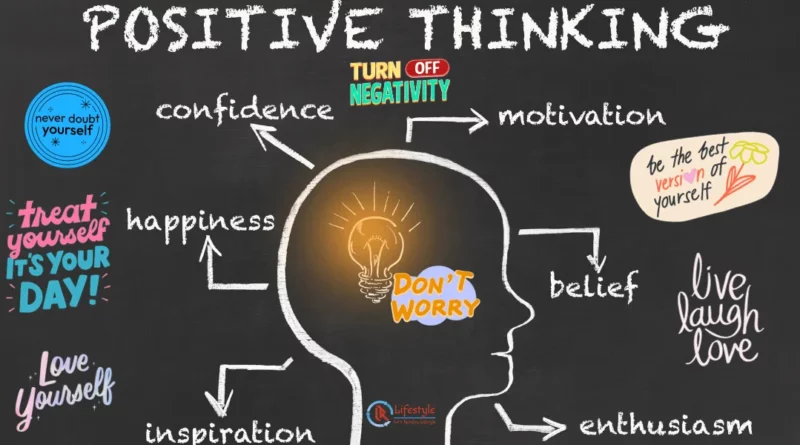Positive thinking: Stop negative self-talk to reduce stress
Positive Thinking: A Powerful Tool for Reducing Stress and Improving Your Life
Maintaining a positive mindset is about steering clear of negative thoughts. Negative thoughts have the potential to harm both your mental and physical well-being as they often lead to stress. Conversely, embracing positive thoughts can infuse your life with meaning and nurture a healthy body and mind.
Positive thinking is the practice of focusing on the bright side of life and expecting good things to happen in life. It involves developing a positive mindset and replacing negative thoughts with positive ones. A negative mindset can cause stress, mental illness, anxiety, low self-esteem, depression, etc. and it can deteriorate your health condition. A positive mindset is very important to achieve success in life because rotten fruit can never taste good.
Positive thinking is important for a number of reasons. It can help to reduce stress, improve mood, boost self-esteem, and increase resilience. Positive thinking can also lead to better physical health, stronger relationships, and greater success in life.
Benefits of Positive Thinking:
Reduced stress: Positive thinking can help to reduce stress by changing the way you perceive and react to stressful situations. When you have a positive mindset, you are more likely to see challenges as opportunities for growth and learning. You are also more likely to be optimistic and hopeful about the future, which can help to reduce anxiety and worry.
Improved mood: Positive thinking can help to improve mood. When you focus on the good things in your life, you are more likely to feel happy and content. Positive thinking can also help to reduce negative emotions, such as anger, sadness, and guilt.
Boosted self-esteem: Positive thinking can help to boost your self-esteem by making you feel more confident and capable. When you have a positive mindset, you are more likely to believe in yourself and your abilities. You are also less likely to compare yourself to others or to dwell on your mistakes.
Increased resilience: Resilience is the ability to bounce back from setbacks and challenges. Positive thinking can help to increase your resilience by making you more optimistic and hopeful about the future. It can also help you to develop coping mechanisms for dealing with stress and adversity.
Better physical health: There is a growing body of research that suggests that positive thinking can also lead to better physical health. For example, studies have shown that positive thinking can boost the immune system, reduce inflammation, and improve cardiovascular health.
Stronger relationships: Positive thinking can also lead to stronger relationships. When you have a positive attitude, you are more likely to be kind and compassionate towards others. You are also more likely to be forgiving and to let go of grudges.
Greater success in life: Positive thinking can also lead to greater success in life. When you have a positive mindset, you are more likely to set goals and work hard to achieve them. You are also more likely to persevere in the face of challenges.
Tips for Positive Mindset
If you are dealing with negative thoughts and are interested in developing a more positive mindset, there are a number of things you can do. Below are a few tips:
Identify your negative thoughts: The first step to stopping negative self-talk is to become aware and acknowledge it. Pay attention to the thoughts that run through your head when you are feeling stressed or upset. Once you identify your negative thoughts, you can start to challenge them.
Challenge your negative thoughts: Ask yourself if your negative thoughts are really true. Are there any other ways to look at the situation? What is the evidence for and against your negative thoughts? How you can overcome all the negative thoughts?
The challenging phase might be difficult but always think you can deal with these stupid thoughts that are draining your energy.
Replace your negative thoughts with positive ones: Once you have challenged your negative thoughts, you can start to replace them with positive ones. For example, instead of thinking “I’m going to fail this test,” you could think “I’m prepared for this test and I’m going to do my best.”
Practice gratitude: Gratitude is a powerful way to reduce stress and boost your mood. Make a habit of taking some time each day to think about the things you are grateful for. Gratitude makes you more humble and you will start thinking that everything is good and beautiful.
Be kind to yourself: Don’t be so harsh to yourself. It is important to be kind to yourself, especially when you are feeling stressed or upset. Talk to yourself the way you would talk to a friend and be your own best friend. Remind yourself that you are capable and that you will get through this. Enjoy your own company and do what makes you feel good.
Practice mindfulness: Amid our fast-paced and ever-changing world, finding a sense of inner peace has become a sought-after oasis for many. Enter mindfulness, a practice that invites us to be fully present in the moment, to observe our thoughts without judgment, and to cultivate a deep connection with ourselves.
Positive thinking is a skill that takes time and practice to develop. However, it is a skill that is well worth developing. Positive thinking can help you to reduce stress, improve your mood, boost your self-esteem, and increase your resilience. It can also lead to better physical health, stronger relationships, and greater success in life.
A personal story about positive thinking
Well, sometimes you don’t get what you deserve and life is not fair at times. But it is okay. It is also okay to cry when you feel like but as the tears leave your eyes, you should also be ready to leave your sorrows, your bad phases behind. Because the only thing is constant in life and that is the change. No matter how much you try, neither the bad times nor the good times remain forever. So when you are in your bad phase, you should keep trying because the more you try, the better composure you will keep the faster the bad times will go. A few years back I used to be a person who was suffering from depression/stress. I was always worrying about the future and dwelling on my past mistakes. Sometimes I used to think that whatever bad was happening in my life was due to my mistake and those thoughts used to drain my energy. This negativity was taking a toll on my mental health as well as physical health. At that time I discovered that I was suffering from diabetes and many other problems. These were all because of the stress, constantly thinking negatively, and not doing anything proactively to change my condition.
One day, I decided that I had had enough. I decided that I wanted to learn how to be more positive. I started by reading books and articles about positive thinking. I also started practicing some of the tips, yoga, and meditation that I learned. I also decided that keeping idle is not going to do anything so started engaging myself in productive activities, started learning new skills, and focused on career growth rather than thinking about the past. Your past doesn’t define your future, your present does.
It wasn’t easy at first. I had to make a conscious effort to catch myself when I was having negative thoughts and to replace them with positive ones. But over time, it became easier.
Now, I am a much more positive person. I still have negative thoughts sometimes but I try to do some meditation at that time. By constantly working on myself, I can say that now I am a positive thinker. Nothing is impossible if you decide to do it with conviction. I personally feel mental health is important.
“Nothing is impossible, the word itself says ‘I’m possible’! ”
Some real-world examples
Oprah Winfrey: Oprah Winfrey has spoken openly about her struggles with stress and anxiety. She has said that positive thinking has been a key part of her healing process. For example, she practices daily gratitude and uses affirmations to boost her self-esteem.
Michael Phelps: Michael Phelps is one of the most successful Olympians of all time. However, he has also struggled with mental health challenges, including depression and anxiety. He has said that positive thinking has helped him to cope with stress and perform at his best. For example, he uses visualization to help him focus and stay calm during competition.
J.K. Rowling: J.K. Rowling is the author of the Harry Potter series. She has said that positive thinking helped her to overcome poverty and homelessness to become a successful writer. For example, she used visualization to imagine herself living a successful life.
Nelson Mandela: Nelson Mandela was a South African anti-apartheid revolutionary, political leader, and philanthropist who served as President of South Africa from 1994 to 1999. He spent 27 years in prison for his anti-apartheid activities. He has said that positive thinking helped him to survive his imprisonment and to lead South Africa to democracy. For example, he focused on his goals and believed that he would eventually be released from prison.
These are just a few examples of people who have used positive thinking to reduce stress and achieve their goals. If you are struggling with stress try some of the positive thinking strategies that these people have used or do something which makes you happy.
Listen to this song: Don’t Worry Be Happy
For News related to entertainment visit our entertainment website:
https://www.glamworldtalks.com/




